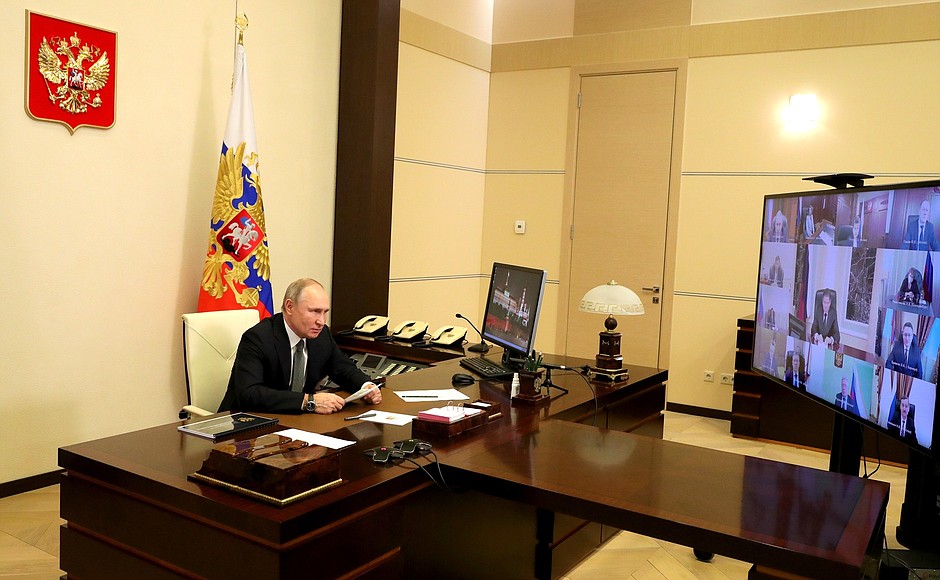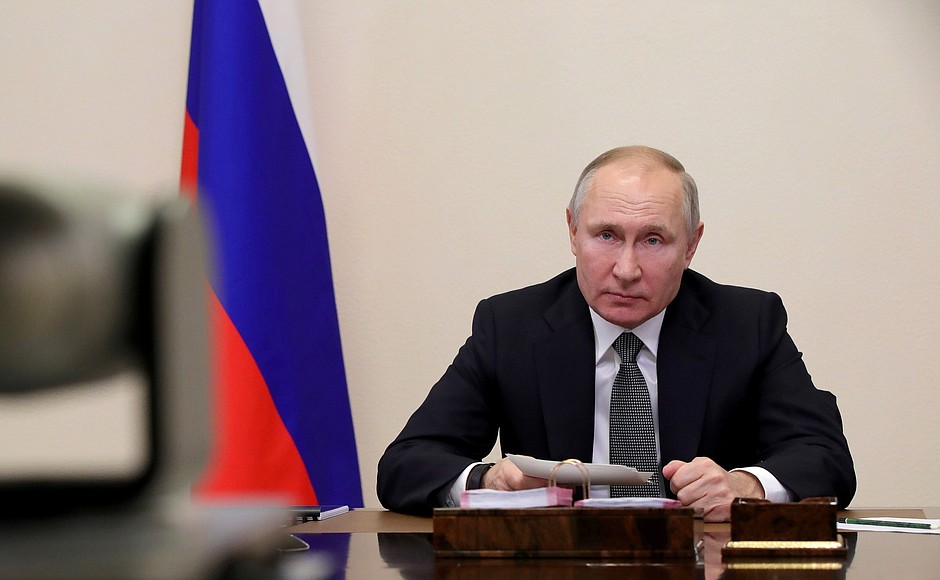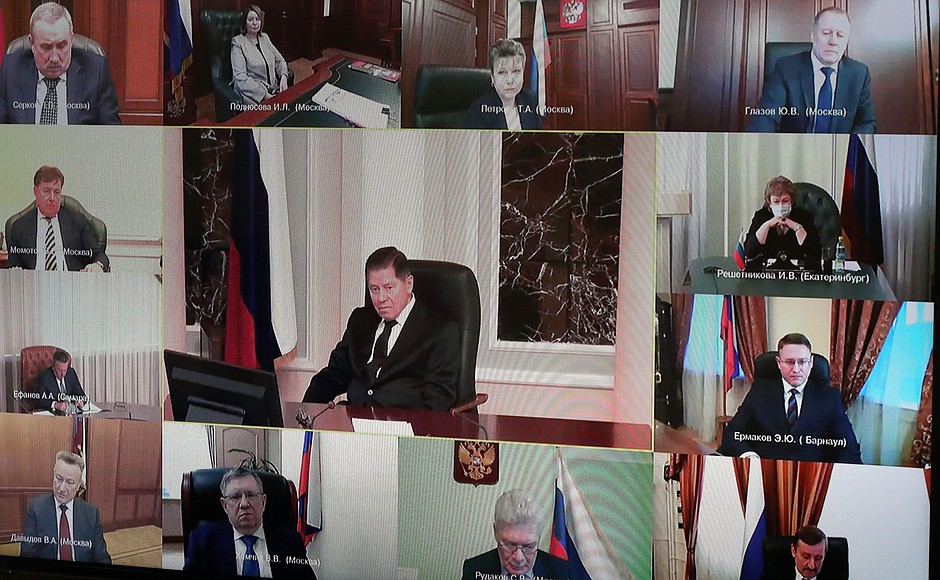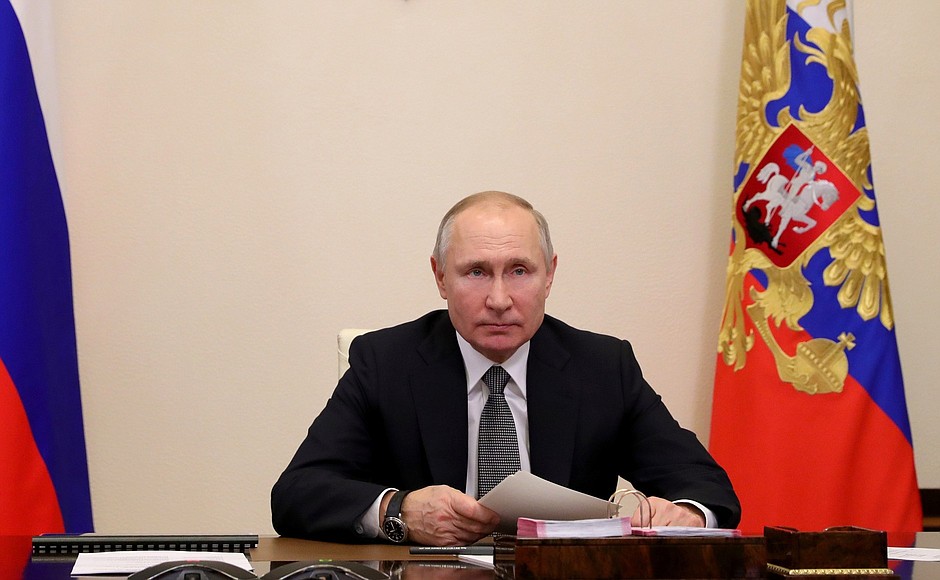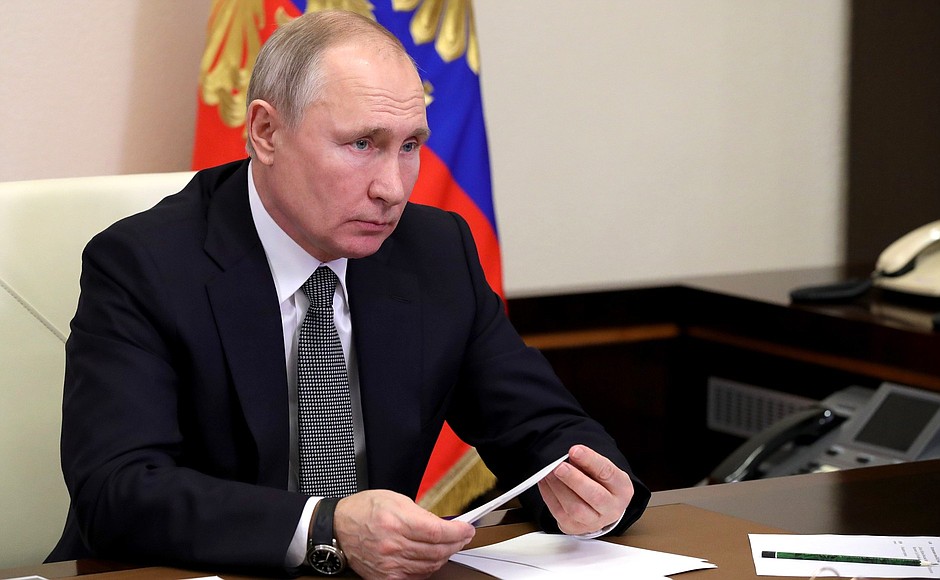President of Russia Vladimir Putin: Good afternoon, Mr Lebedev, colleagues, friends.
I am very happy to welcome you ahead of the annual meeting; the agenda of such meetings always includes many important matters. I am confident that there are many matters on your current agenda that need to be discussed and, most importantly, require a detailed solution in the interests of strengthening the national judicial system and more reliably and effectively protecting the citizens’ rights and freedoms.
I would also like to thank you and all the Russian judges who created and implemented an optimal algorithm of activity in the difficult conditions of the pandemic.
We talk a lot about doctors, and we have every reason to thank them for their dedicated work. But I cannot help but mention that the country’s judicial system did not slow down during the difficult period when the infection continued to spread, something that commands tremendous respect. This is exactly what happened in some countries where up to 50 percent of all court cases were postponed until a later date. On the contrary, our system functioned smoothly without interruption.
The courts remained loyal to their lofty mission and worked to the best of their capacity, despite epidemic-related risks, while protecting the rights of citizens and the interests of society and the state.
Suffice it to say that more cases were reviewed last year than in 2019 because citizens and business persons started requesting judicial protection, and this confirms greater trust in court proceedings.
It is also important to note that the quality of justice remained high, despite the greater workload, and this aspect continued to improve. I would like to note that this is not just our assessment. According to the European Commission’s report, published in November 2020, Russian courts achieved some of the best results among Council of Europe countries. We have many questions for them, and vice versa, but this is an objective assessment. Notably, the European Commission’s experts unanimously decided that the Russian judicial system was more efficient, more technologically advanced, and the least costly for citizens.
Of course, our judicial system has demonstrated an ability to quickly adapt to absolutely new conditions. This is obvious. However, I would like to point out that it was an informed and voluntary choice of the judicial community itself, of the courts, because back at the very beginning of the pandemic the Presidium of the Supreme Court and the Presidium of the Council of Judges adopted two joint resolutions with recommendations for court procedures in the new conditions.
These documents included a list of categories of cases the hearing of which could not be suspended or postponed. As far as I remember, they include the choice of measures of restraint, parole applications, commutation of sentences and release on medical grounds. There are also cases related to the pandemic, of which there is a great number, for example, the cases of those who have no funds to repay their debt because they have lost their jobs or income because of the pandemic and the sanitary restrictions.
In other words, the Supreme Court and the Council of Judges have outlined for the courts the list of the most socially topical cases that cannot be postponed.
As for the other categories of cases, the courts were granted the right to decide independently whether to hear them without delay or postpone them until a more epidemiologically safe date.
The increased number of cases heard last year, which I have already mentioned, shows that Russian courts have not reduced their activities to a minimum but decided to do as much as they could. In fact, they did not divide cases into categories based on their importance, but accepted virtually all applications, acting on the principle that each situation that needs to be decided in court is crucially important for the person involved and his or her family. At the same time, they maintained the social focus of jurisdiction.
This is true not only of the courts’ daily work, but also of the development of a uniform judicial practice. The Supreme Court has issued a number of reviews and instructions for courts on the application of laws and the mistakes they must avoid. They provided especially detailed and comprehensive reviews of labour and social cases, that is, the most pressing issues at that time.
According to the review of employment-related practice, the Supreme Court has defended workers' rights in various dismissal disputes, for example, by prohibiting severe punishment of workers for absence from the workplace for good reason.
In this regard, I would like to underscore the importance of the continuous improvement of judicial activity underway in Russia. We regularly discuss this with the President of the Supreme Court. The most progressive and most relevant initiatives are generated in the judicial community.
I am certainly aware of this idea, the idea that a system can never reform itself. But I never agreed with skeptics who argued that the judicial system cannot develop itself. As we can see, it can, and quite successfully.
Promptly responding to changes in society and the world, and analysing socio-political trends, problems, and threats, the Supreme Court studies and generalises proposals coming from courts; it also develops and implements new ways of improving the quality of judicial practice.
Your initiatives help consolidate the people’s right to justice and its accessibility, and ensure the transparency and openness of the courts’ work. By the way, that transparency and openness were also maintained during the pandemic – we are especially grateful to you for this.
Judicial proceedings are also being optimised, and judicial protection is growing more effective. Appropriate measures are being taken to further enhance the principle of independence of judges, to evenly distribute their workload, although it is very heavy, and I know about that. Rules are being carefully worked out to enhance the role of the judicial process, to make the judicial process more rational, and the procedure for appointing judges even more transparent.
Colleagues,
I wish the entire judiciary in Russia good health and professional achievement, and of course, productive and rewarding work, including in the areas that I have outlined today.
Once again, I thank you for your attention and wish you all the best.
<…>
Vladimir Putin: Mr Lebedev, colleagues,
At the end of this part of your work, I would like to repeat something I have already mentioned in passing in my opening remarks, namely that in some countries, including European countries, about 50 percent, or even more, of the courts simply closed during the pandemic. This was not the case in Russia.
While complying with the sanitary doctors’ requirements, Russian courts used modern premises timely equipped with advanced technology, and that helped them set up their work in such a way that it remained efficient, transparent, understandable, and accessible for the public and the press. Please note that, according to the data I have, the number of registered personal accounts has reached almost 18.5 million. You managed to launch the work of appeal and supervisory courts of general jurisdiction in these difficult conditions. But you did it.
Most importantly, there were no outbreaks of COVID-19 in the judicial system itself. This means that the work was properly organised. For all that I want to thank you.
I wish you success.
Thank you very much.
